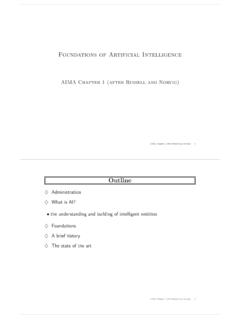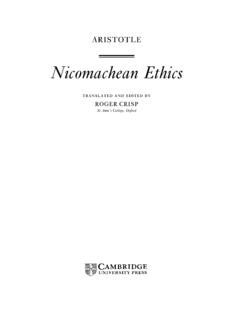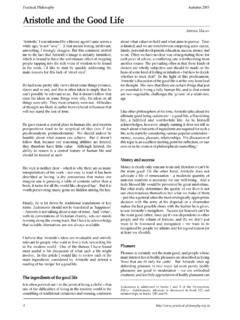Transcription of Aristotle on Happiness - Pursuit Of Happiness
1 Aristotle on HappinessA Little BackgroundAristotle is one of the greatest thinkers in the history of western science and philosophy, making contributions to logic, metaphysics, mathematics, physics, biology, botany, ethics , politics, agriculture, medicine, dance and theatre. He was a student of Plato who in turn studied under Socrates. Although we do not actually possess any of Aristotle s own writings intended for publication, we have volumes of the lecture notes he delivered for his students; through these Aristotle was to exercise his profound influence through the ages.
2 Indeed, the medieval outlook is sometimes considered to be the Aristotelian worldview and St. Thomas Aquinas simply refers to Aristotle as The Philosopher as though there were no was the first to classify areas of human knowledge into distinct disciplines such as mathematics, biology, and ethics . Some of these classifications are still used today, such as the species-genus system taught in biology classes. He was the first to devise a formal system for reasoning, whereby the validity of an argument is determined by its structure rather than its content.
3 Consider the following syllogism: All men are mortal; Socrates is a man; therefore, Socrates is mortal. Here we can see that as long as the premises are true, the conclusion must also be true, no matter what we substitute for "men or "is mortal." Aristotle 's brand of logic dominated this area of thought until the rise of modern symbolic logic in the late 19th was the founder of the Lyceum, the first scientific institute, based in Athens, Greece. Along with his teacher Plato, he was one of the strongest advocates of a liberal arts education, which stresses the education of the whole person, including one's moral character, rather than merely learning a set of skills.
4 According to Aristotle , this view of education is necessary if we are to produce a society of happy as well as productive as the Ultimate Purpose of Human ExistenceOne of Aristotle 's most influential works is the nicomachean ethics , where he presents a theory of Happiness that is still relevant today, over 2300 years later. The key question Aristotle seeks to answer in these lectures is: what is the ultimate purpose of human existence? What is that end or goal for which we should direct all of our activities? Everywhere we see people seeking pleasure, wealth, and a good reputation.
5 But while each of these has some value, none of them can occupy the place of the chief good for which humanity should aim. To be an ultimate end, an act must be self-sufficient and final, "that which is always desirable in itself and never for the sake of something else," and it must be attainable by man. Aristotle claims that nearly everyone would agree that Happiness is the end which meets all these requirements. It is easy enough to see that we desire money, pleasure, and honor only because we believe that these goods will make us happy.
6 It seems that all other goods are a means towards obtaining Happiness , while Happiness is always an end in Greek word that gets usually gets translated as " Happiness " is eudaimonia, and like most translations from ancient languages, this can be misleading. The main trouble is that Happiness (especially in modern America) is often conceived of as a subjective state of mind, as when one says one is happy when one is enjoying a cool beer on a hot day, or is out "having fun" with one's friends. For Aristotle , however, Happiness is a final end or goal that encompasses the totality of one's life.
7 It is not something that can be gained or lost in a few hours, like pleasurable sensations. It is more like the ultimate value of your life as lived up to this moment, measuring how well you have lived up to your full potential as a human being. For this reason, one cannot really make any pronouncements about whether one has lived a happy life until it is over, just as we would not say of a football game that it was a "great game" at halftime (indeed we know of many such games that turn out to be blowouts or duds).
8 For the same reason we cannot say that children are happy, anymore than we can say that an acorn is a tree, for the potential for a flourishing human life has not yet been realized. As Aristotle says, "for as it is not one swallow or one fine day that makes a spring, so it is not one day or a short time that makes a man blessed and happy." ( Nichomachean ethics ,1098a18)The Hierarchical View of NatureIn order to explain human Happiness , Aristotle draws on a view of nature he derived from his biological investigations.
9 If we look at nature, we notice that there are four different kinds of things that exist in the world, each one defined by a different purpose that it has:Mineral: rocks, metals and other lifeless things. The only goal which these things seek is to come to a rest. They are "beyond stupid" since they are inanimate objects with no soulVegetative: plants and other wildlife. Here we see a new kind of thing emerge,something which is alive. Because plants seek nourishment and growth, they have souls and can be even said to be satisfied when they attain these : all the creatures we study as belonging to the animal kingdom.
10 Here we see a higher level of life emerge: animals seek pleasure and reproduction, and we can talk about a happy or sad dog, for example, to the extent that they are healthy and lead a pleasant lifeHuman: what is it that makes human beings different from the rest of the animal kingdom? Aristotle answers: Reason. Only humans are capable of acting according to principles, and in so doing taking responsibility for their choices. We can blame Johnny for stealing the candy since he knows it is wrong," but we wouldn't blame an animal since it doesn't know any seems that our unique function is to reason: by reasoning things out we attain our ends, solve our problems, and hence live a life that is qualitatively different in kind from plants or animals.




